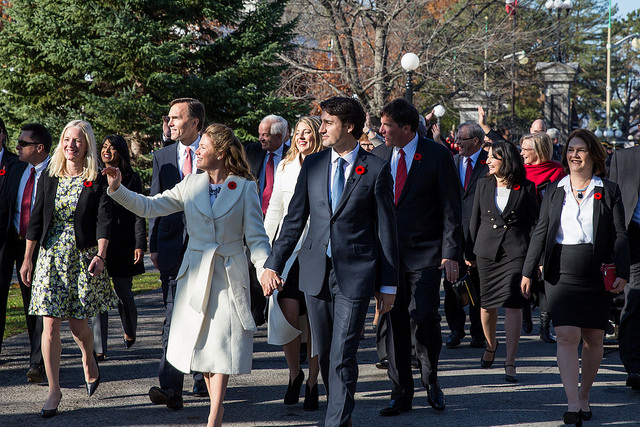rabble is expanding our Parliamentary Bureau and we need your help! Support us on Patreon today!
On October 19, after the longest campaign in recent history, the Liberals under Justin Trudeau were elected to a majority government in a crimson haze of Trudeaumania 2.0; Jack-Layton-esque hope/change/optimism branding; and anti-Harper sentiment (or, perhaps more accurately, fear of what a re-elected Conservative government would mean) as lifelong Liberals, self-defined progressives, and first-time voters threw their support behind the party with the greatest momentum and who most unapologetically trumpeted the message “we’re the opposite of Harper.”
Two weeks later, Canadians were treated to the masterfully crafted swearing-in of the gender-balanced cabinet and the new, youthful, highly photogenic prime minister, against a backdrop of a perfect autumn day complete with blue sky and fall foliage. And within hours, promises were being made: a new “tone” for government; Justin Trudeau practically body-surfing into crowds of onlookers; media stunned at their proximity to a real life PM after years of being kept a safe distance away from an apparently hermetically sealed one; the return of the mandatory long-form census; the words “climate change” added to the environment minister’s title; a First Nations woman as federal justice minister.
The giddiness continues: nice things are being said to a battered and shell-shocked public service; the Canadian Labour Congress was addressed by a sitting PM for the first time since Diefenbaker; the National Press Theatre was opened up and (presumably) aired out for a press conference; scientists are being told they can once again talk about their research in public and to the media; and of course there are the selfies, selfies and more selfies.
The analysis is still being done about the messages that resonated, the turning points in the campaign (was it the niqab? The balanced budget promise? The too-safe stance of the NDP? Justin’s legendary charisma?) and whether or not this truly ushers in a new, progressive, era in politics.
“Canada is back!” announced Justin, (more than once) to the world.
But are we? And back to what, exactly?
Don’t get me wrong. I think another four years of a Conservative government would have been devastating to what remained of our political and social infrastructure.
But I also think it’s a huge mistake for progressives, or those reeling from the reduction of the NDP to third-party status, to condemn or belittle those who are experiencing a sense of relief, warm familiarity and renewal that gave the swearing-in ceremony the feel of a coronation.
Clearly, for the foreseeable future the Liberal government has at its disposal a deep well of desire on the part of Canadians to feel better (let alone good) about ourselves as a country, after nearly a decade of consciously feeling so embarrassed — if not depressed. As a friend in the public service (who, while not on the video of Trudeau triumphantly visiting the newly christened Global Affairs Canada, was in the room) explained: “we don’t expect this to be perfect, and of course it’s not going to last forever. But it feels so good to just not feel so bad about ourselves and the work we do.”
I’ve talked to a number of public servants who have echoed that sentiment. They’re not naïve — many of them have been through the earlier rounds of austerity under the Chretien-Martin Liberals — and they’re fully aware that this is a temporary state of euphoria. But they’re also realizing how deeply they had internalized a negative sense of self-worth and, more disturbingly, how so much of this happened without us realizing it, or even (certainly where much of the media was concerned) with our tacit acceptance. We were the proverbial frogs in boiling water.
This is the space the new Liberal government inhabits — the space between extremely high hopes for what a new administration can bring, and our exceedingly low standards that were forcibly downgraded over the past nine years. It’s a dangerous combination, where basic civility and common courtesy can pass as groundbreaking, at a time when truly groundbreaking policies are needed.
Here’s the other thing: we are emerging from what’s been referred to as a “lost decade.” But it’s a mistake to think that merely “undoing the damage” of the Harper Conservatives is all that’s required to return Canada to its honourable reputation — assuming it ever really existed.
Because let’s be honest: 10 years ago, we were disappointing; coasting on the fumes of our romanticized and whitewashed Pearsonian/Trudeau Sr.-esque identity.
By 2015, however, we’d become embarrassing.
We are certainly dealing with the fallout of a decade-long concerted and unapologetic attack on Charter rights; on equality; on people living with poverty; on racialized people, on First Nations; on women; on the environment; on science, information and data; on food security; on basic safety regulations; on the public service; and on our social programs.
But, on the eve of our 42nd parliament, let’s not pretend that the decade prior to this one — replete with tax cuts, slashed spending and the loosening of funding requirements — had no impact on many of those same things.
The stakes are so much higher now — locally, nationally and globally. Let’s hope we don’t truly think that a return to our pre-Harper state of disappointing is anywhere near enough.
Let’s hope that the rhetoric (or even the visuals) of change isn’t seen as a convenient, feel-good substitute for the measureable, targeted, enforceable actions required to address the inconvenient truths of our time.
Let’s hope — no, let’s prove that our standards haven’t fallen that far.
Erika Shaker is Director of Education and Outreach. This is an edited version of the editorial for the fall 2015 issue of Our Schools / Our Selves. Follow Erika on Twitter @ErikaShaker.
Photo: Prime Minister of Canada/flickr
rabble is expanding our Parliamentary Bureau and we need your help! Support us on Patreon today!



